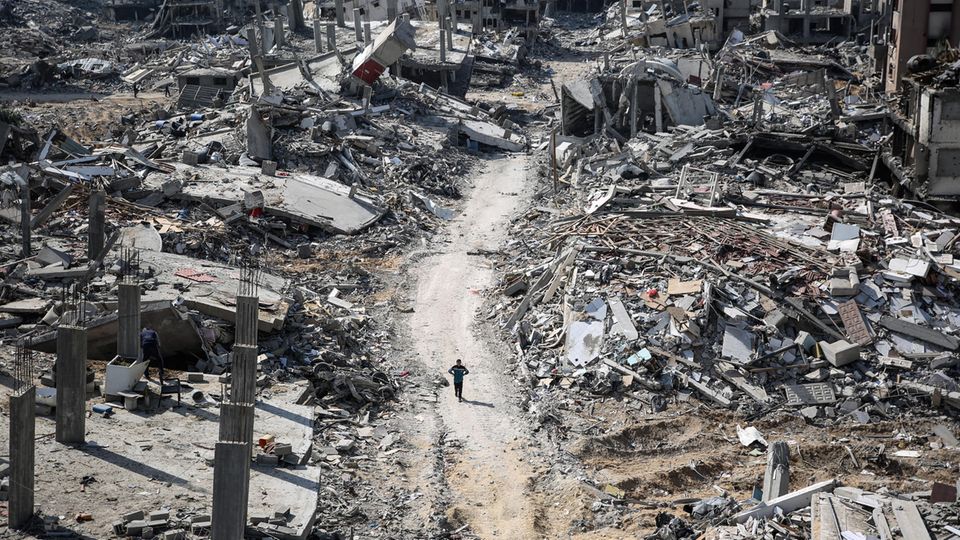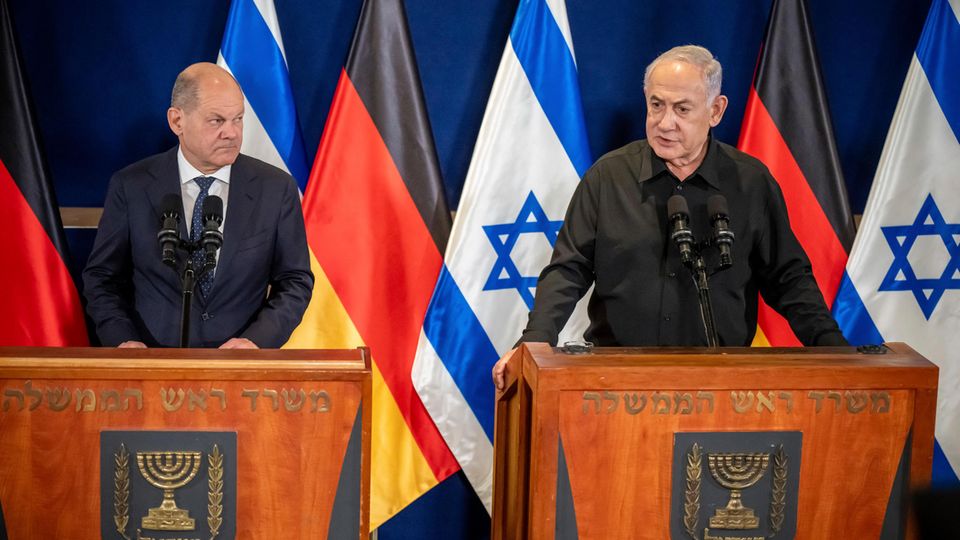Abed is Palestinian, Margalit is Israeli. Both believe in peace. We don’t seem to be able to do that in the debate here. Journalist Sophia Maier explains why we should dare to be more empathetic.
“Anti-Semitic.”
“Disgusting terrorist supporter.”
“Jew hater.”
And: “Sophia inherited her grandparents’ trauma of having lost the war before they systematically and industrially murdered all Jews.”
These are just a few examples of comments I have received in the past few days. The trigger was a posting on social networks. I wrote that criticism of Israel is not the same as anti-Semitism and lamented how silent many people are despite the events in Gaza. My post ended with the sentence: “What is currently happening in Gaza is incompatible with our humanism, our understanding of human dignity and our morality.”
A massive shitstorm followed with hundreds of comments and messages. Not the first wave of hate I’ve had to experience. As soon as I comment on the Israel-Gaza war, anger flares up. On both sides. But I’m not the victim here. I tell this story because for me it is a symbol of our black and white thinking, of the narrow discourse in Germany, of the growing inability to listen to other people.
A war is not a sporting event
The debate in our country about the Israel-Gaza war sometimes feels like a football match. Decide: Are you for or against Israel? Are you for or against the Palestinians? Where do you stand? As if this war were a sporting event.
Although we live in a democracy, in one of the best countries in the world, there is currently little space in this country for thinking, feeling and reflecting. There is little room for the shades of gray, for considerations, ambiguities, ambivalence. And there is even less room to examine both sides equally. The inhumane, bestial terrorist attack by Hamas, the murdered and the hostages on the Israeli side. The disproportionate actions of Israel and the endless suffering of the civilian population of Gaza.
There are truths that are not debatable. It is undeniable that there is nothing in the world that could in any way justify this disgusting terrorist attack on October 7, 2023. Anyone who does that has left the democratic discourse. Equally, it is not debatable that international humanitarian law is binding and that too little is being done to protect the lives of civilians in Gaza. Anyone who doubts this has also left the democratic discourse. But there are also truths that cannot be seen with the naked eye. It is our duty to look carefully, ask questions and listen.
As a journalist, my job is to educate and portray realities far away from good and bad stereotypes, to hear and speak from all sides. This journalistic ethic, to which we are committed in this profession, should always be the basis of our work – regardless of moral or social values and regardless of our own opinions and attitudes.
The only common denominator is the inhumane suffering
For my current report I tried to do exactly that: to draw a picture that is more complete than the one known in this country. I met people whose living conditions couldn’t be more different. People who couldn’t look at this war more differently. people whose perhaps only common denominator is the inhumane suffering they have suffered; Cruelties, constant fear for their lives, grief for their families.
For example, I was allowed to accompany Ricarda Louk. We were together at the festival site near Gaza, from where her daughter Shani was kidnapped and brutally killed by Hamas terrorists. Here she planted a tree for Shani, a monument that will forever commemorate her cheerful daughter.
I then met two Palestinian sisters in the Israeli-occupied West Bank: Fatima and Sarah. Her brother Taha, just 15 years old, was shot dead by Israeli soldiers. Taha’s big dream was to go to university and become an engineer.
On my trip, I visited Palestinian villages in the West Bank, which are affected by massive settler violence, and then in Israeli kibbutzes on the border with Gaza, which were brutally attacked by Hamas. I accompanied radical settlers to the border where they were blocking urgent aid deliveries to civilians in Gaza. A 16-year-old girl told me on camera: “You can starve as far as I’m concerned. You don’t deserve any mercy.” And I interviewed fighters from the terrorist organization Islamic Jihad who cheered the brutal terrorist attack on October 7th and threatened another, even bigger October 7th.
They were complex encounters. In my conversations, I surprisingly experienced not only great unforgiveness, anger and pain, but also hope: for a better future, for understanding and peace. There are two people who particularly touched me and showed me what real humanity means, far away from friend-enemy thinking.
One person’s name is Abed Wadi. His family comes from the West Bank. Abed’s brother Ibrahim and his nephew Ahmad were brutally shot from a moving car by radical settlers in the West Bank five days after October 7th.
I asked him, “Do you have empathy for the people who were murdered on October 7th?”
He replied: “Empathy? Yes, of course. I have great empathy for these murdered people. I am against all murder. Murder is forbidden in our religion. We are people who love our religion and peace.”
“Do you still believe that peace is possible?”
“Sure. I wish for peace in the future for the children, for every group in this country. For Palestinians and Israelis.”
You make peace with enemies
The other person is Margalit Moses. She had lived since birth on Kibbutz Nir Oz, where she was kidnapped by Hamas on October 7th. She remained hostage in the terrorist tunnels for 48 days until she was released. Nobody can imagine the fear of death she suffered during this time.
I ask the 77-year-old: “What goes through your mind when you think of the people in Gaza?”
She replied: “I’m very sorry because I think the people there are not all Hamas. I’m sad that they feel this way.”
“After everything you’ve experienced, do you still have hope for real peace?”
“Yes. You make peace with enemies. That’s how I learned.”
Margalit and Abed. Both have damn good reasons to stop listening to the other side, to not feel empathy, to hate the other. But they do the opposite. They feel the other side, they listen to each other, they believe in peaceful coexistence despite their blows of fate.
If Abed and Margalit, who have both experienced unimaginable things, can do it, can’t we do it too? Is it not possible for our privileged society to engage in more intensive conversation and to conduct the discourse in all its facets?
In a democracy that should offer every opportunity to obtain comprehensive information, exchange ideas and publicly express one’s own opinion, a narrowing of discourse and relentlessness in the discussions, as is currently the case in Germany regarding the Gaza war, is out of place.
We urgently need an open debate and more tolerance: not wanting to convince others, allowing other positions, listening, thinking about it carefully and reflecting. Be open to views other than your own.
As a journalist, that is exactly my duty: I look impartially, talk to people and pass on their stories. And in this role I would like to advocate for more empathy from both sides and for both sides. As humans, we are united by the capacity for compassion: we should have it for everyone – Israelis and Palestinians.
Transparency note: The star is part of RTL Deutschland.



